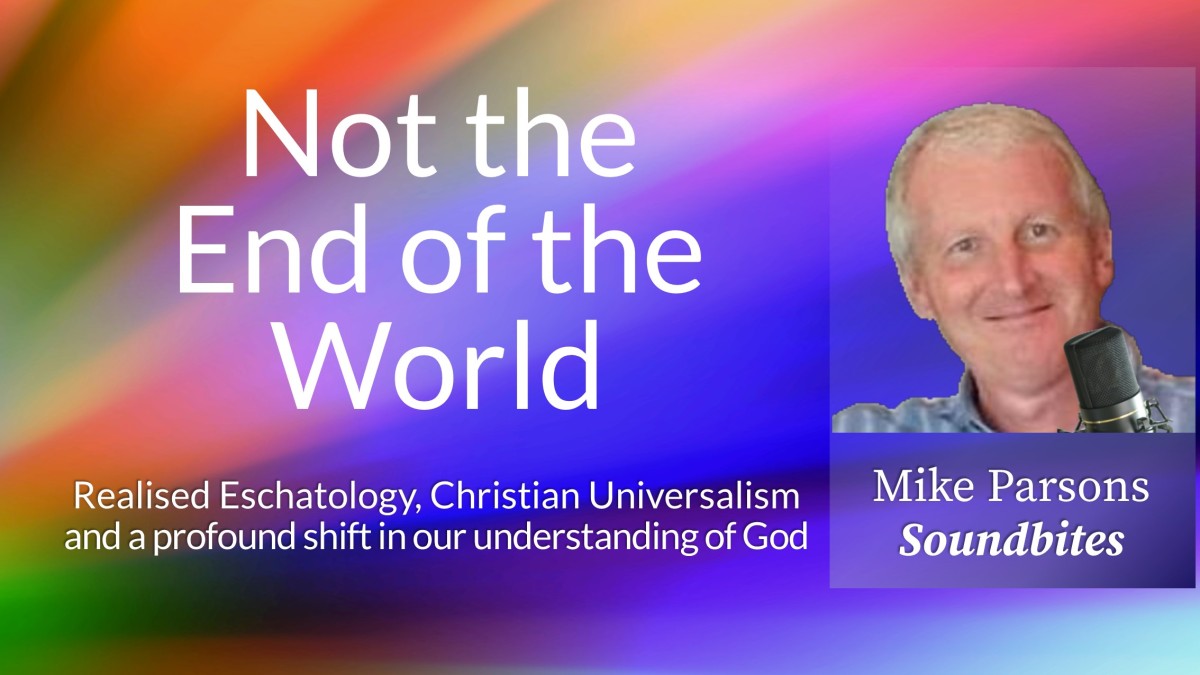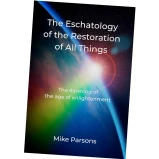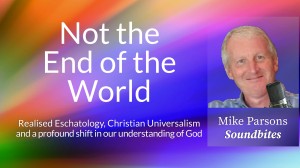Mike Parsons –
Understanding Realised Eschatology
Realised eschatology, for me, is also heading for an understanding of Christian universalism. The same scriptures Jesus referred to concerning hell (Gehenna) are in the same passage as those that speak of the end of the age – not the end of the world, but the conclusion of their Old Covenant age. People faced being cast into Gehenna if they remained in Jerusalem when the Roman armies invaded. They would be crucified, and a few hundred thousand were thrown into the literal Gehenna.
This is the concept of hell, as commonly understood in English. Of course, Christian Universalists would say hell is a different thing, and some deny its existence altogether. Personally, I see it as a place where those who haven’t come to know Jesus in life still have the opportunity to choose him after death – death is not the end of choice. Rather than a realm of punishment and torment, I see it as the fire of God’s loving presence which purifies and refines.
The scriptures that mention Gehenna portray it as a consequence of staying entrenched in the old covenant ways, not some future judgment scenario. It was a warning of a physical manifestation of death. Jesus warned his followers to flee Jerusalem when they saw certain signs: they understood this and ran to the hills, to find safety in Pella. By heeding his words, they were physically saved from the destruction that befell Jerusalem.
Signs
All that being said, I believe God introduces concepts like this to steer the church back to first principles, into a deeper relationship in which we experience Him intimately, face to face. Once we do, we no longer need the signs which pointed us towards this reality.
Experiential connection
In my preaching of the gospel, I aim to introduce people to Jesus in a way that facilitates a tangible, experiential connection with the Father. It is only through this intimate relationship that someone can truly understand and experience God’s unconditional love, find spiritual healing and wholeness, and embrace their identity and inheritance as a child of God. I believe God is gradually weaning us off an over-reliance on healings and miracles, so we can live in mystical experience with Him. This shift is not about abandoning miraculous manifestations altogether but that we use them for the purpose of outworking what God is doing in the earth.
We have the ability to govern and rule, to establish the Kingdom of God on earth as it is in heaven. This process begins first within our own lives, then thorough our lives, and ultimately leads to the creation of places on earth which do not operate under the government of earth but under the government of heaven. There will be no sickness there, no disease, no lack, no poverty: nothing contradictory to the fullness of life as children of God.
Cultivating relationship
In the Mystic movement, there is a shift away from seeking outward manifestations like healings towards cultivating a deeper relationship with God in which health and wholeness naturally flow, and the focus is no longer on individuals performing healing. God is our healer.
Early Christians underwent a profound shift in their understanding of God, moving moved away from viewing Him through the lens of an outdated religious and political system. Instead, Jesus revealed God as love incarnate, challenging their preconceptions and inviting them into a relational encounter with the Father. He came to undo their whole understanding of God from an Old Covenant mentality. This shift from a legalistic mindset to one grounded in relationship and experience to which Jesus is the door, empowered them to operate in sonship, seated in heavenly places, and to manifest the Kingdom of God on earth as it is in heaven.
The God that we know
Key takeaway
Preaching the gospel is about leading people to encounter the God we know, so that they can embark on their own journey of discovering His love and life-changing power for themselves.








Beautiful Mike as always